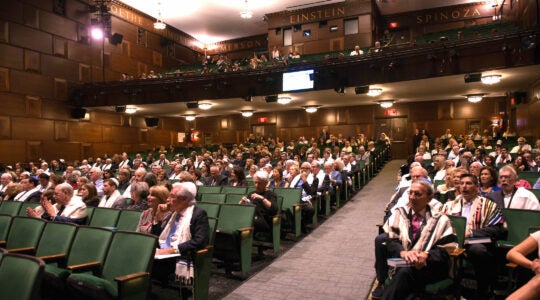I was coming to the destination. I was going to fetch my portrait of the Rebbe. My fantasy was a personal quiet meditative event. Me and the Rebbe, the Rebbe and me. But it was a seething hive of Jews. Near the entrance is a washstand, as it’s customary to wash hands on returning from a grave. But any sense of actually being at a grave is overwhelmed by the crowd. I’d come at the peak hour, just before Rosh HaShanah. Last chance to have a special conversation with Rebbe Nachman. For me, it would have to be a sort of shouting conversation and at a distance.
The place was packed with men of all colors, shapes and sizes. No feminine energy here. No effort has been made by the various havurot to welcome or accommodate women during Rosh HaShanah in Uman. And that was always the complaint, back in the time of the chasidim: that the men would leave their families and children behind on the Jewish holidays and journey to be in the court of the rebbes. The complaint then and now, too.
I made my way back inside and looked for Ozer at the prayer benches. He gave me a copy of Tikkun Ha-Klali, the complete remedy or perfect cure. These are 10 psalms selected by Rabbi Nachman for purification. Reciting the tikkun is another prerequisite before asking for Rabbi Nachman’s help. I opened the booklet. The psalms were in Hebrew, and I could read every word and understand about a quarter of them. I sat on a bench and recited the syllables of the opening psalm: “Miktav david shamrani el. Ki hasiti vach.” What is this . . . Miktav david — I know a miktav is a kind of psalm — of David. El is a name of God. Shomer . . . to protect . . . shamrani el protect me God . . . Ki . . . because. . . . My halting Hebrew halted.
Without the familiar pony of an English translation I struggled to piece together words into phrases. I focused on each word, each line, to make sense, but it was too much. There were pages and pages of psalms to read. So I gave up making sense. I was determined to finish. I kept saying the syllables I could give no meaning to. As each syllable came, and I turned the pages, word by word, line by line, a feeling of sadness grew. A grown man who could not read a psalm. Something broke. My eyes filled with tears.
I’d studied Hebrew on and off again ever since college, taken private lessons like Kafka, and worked my way through textbooks. But I never mastered it. I looked up all around me and saw Jews with the tikkun, some chanting devoutly and rapidly, others slowly, meditatively. Kafka sat near the back of the class and I was sitting behind him. I felt broken and humbled. Who was I to come here among these Jews, any one of whom knew more Hebrew as a child than I did now?
The psalms had broken me. I had given my penny to charity and recited the 10 psalms, even if most of them came out in my head as gibberish. Now I came as close as I could to the tomb and just isolated myself from the surroundings. I was going to meet Rabbi Nachman. I closed my eyes, but I still couldn’t picture him in my mind. It wasn’t just a matter of his face. What was I doing there? Who or what was I talking to or through? Kafka was no help, He was laughing about the whole thing. All these men swarming and sweating, wearing towels from the mikvehs around their shoulders. “Dirty and pure” he said, gray water in the mikveh. Then he went to sleep in his mug.
It was just me and this crush of Jews — and something in that granite tomb. A bone? Dust? Nothing? If I closed my eyes I had no image of him. I could not see his face. All that came to mind was that famous chair, which long ago a chasid had presented to Rebbe Nachman. After his death, during czarist pogroms, there was a fear that the grandly carved chair would be destroyed. So his chasidim had chopped it up into little pieces and smuggled it out of Breslov (also known as Bratslav). Now that same chair sits in a yeshiva in Meah Shearim, so beautifully assembled you cannot tell it was ever broken. “If you believe you can damage,” Rebbe Nachman once said, “believe you can repair.”
Things got quiet in me. And I saw.
I saw a man with a scraggly beard and dark intense eyes. He wore a black raincoat. The boy beside him could have been no more than 5, with dark eyes and short hair and curly payot. A black kipa with a silver band. The father told the boy something and the boy listened intently. I came as close as I could, to eavesdrop. The father opened a copy of The Complete Tikkun, Tikkun Ha-Klali — there were copies on racks and scattered all over the place. He chanted a single syllable. Mik, the father chanted. Mik, the son repeated. Tav, the father chanted; Tav, the son repeated. Da, the father chanted. Da, the son repeated, Vid . . . vid . . . each time chanting with the same melody: high note, then low.
Sham … sham … Ra … ra … Ni … ni … El … El. Shamrani El. Protect me, God.
He had brought this boy from God knows where, brought him all the way to Uman. Maybe he believed the promise, that if a young boy came to Rabbi Nachman’s Rosh HaShanah, someday he would also marry under the chupah in a kosher Jewish wedding. Or maybe he just wanted to share this tikkun with his son. He was focused on his son, as his son was focused only on him. The transmission was never broken, the love that goes with the transmission, the intimacy of the learning. At least in that moment.
Father and son. The face of the father and the face of the son. The face of the teacher and the face of the student. Given all the ruptures in Jewish history, this transmission was still going on.
I’d felt broken by my failure to read the Hebrew. But now I thought: these broken syllables the father recited, what could they have meant to his boy? The tikkun was not in the meanings, it was not intellectual at all. The tikkun was in the feeling passing between them, in the melody the father used to carry it, high note, low note, high note, low note.
Sham … sham … Ra … ra … Ni …
ni … El … El. Keep me, God.
That’s when I saw Rabbi Nachman’s face.
Rodger Kamenetz’s books include “The Jew in the Lotus” and “The History of Last Night’s Dream.” A winner of the National Jewish Book Award, he is LSU Distinguished Professor at Louisiana State University and founding director of its Jewish Studies Program.
From “Burnt Books: Rabbi Nachman of Bratslav and Franz Kafka” to be published in October. Reprinted courtesy of Schocken Books, a division of Random House, Inc. Copyright (c) 2010 Random House, Inc.
The New York Jewish Week brings you the stories behind the headlines, keeping you connected to Jewish life in New York. Help sustain the reporting you trust by donating today.




